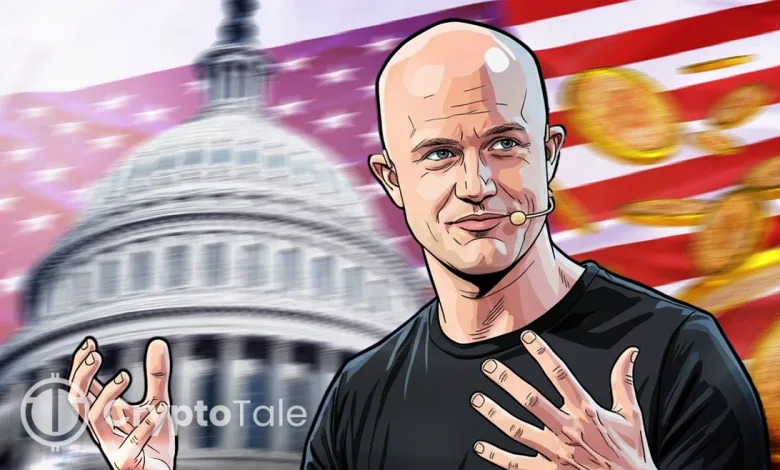Coinbase CEO: Crypto Market Structure Bill Nearly Complete

- Brian Armstrong says the crypto market bill is 90% done, with DeFi rules still pending.
- Lawmakers aim to advance the bipartisan crypto bill by Thanksgiving, pending Senate review.
- Stablecoin reward rules remain under discussion amid ongoing banking lobby pressure.
Coinbase CEO Brian Armstrong said that the long-debated U.S. crypto market structure bill is “90% complete,” with the remaining 10% centered on how decentralized finance (DeFi) and stablecoin rewards will be regulated. His remarks followed bipartisan meetings on Capitol Hill as lawmakers sought to finalize the landmark legislation before Thanksgiving.
Bipartisan Push Despite Shutdown
Speaking from Washington, D.C., Armstrong said both Senate Democrats and Republicans have reached a broad agreement on most of the bill’s text. “DC may be shut down, but momentum for market structure clarity is at an all-time high,” he said in a video posted on X.
Despite the partial government shutdown, he described the ongoing talks as some of the most productive to date. Armstrong confirmed that he had met with senators from both parties earlier in the week.
He said that “draft text is being shared back and forth,” adding that “both sides are 90% on the same page.” The meetings lasted several hours and included figures such as Senate Majority Leader Chuck Schumer, Sen. Tim Scott, Sen. Kirsten Gillibrand, and Sen. Cynthia Lummis.
The Coinbase CEO emphasized that only a few critical issues are unresolved. Chief among them is how to apply regulatory oversight to decentralized platforms without stifling innovation. This final portion of the legislation, he said, will determine how DeFi protocols and centralized exchanges are treated under U.S. law.
DeFi Rules and Stablecoin Rewards
Armstrong urged lawmakers to ensure that regulation targets centralized intermediaries, like Coinbase, rather than open-source DeFi protocols. He argued that decentralized software should be outside traditional frameworks designed for custodial platforms.
His comments indicate a growing industry push for clarity on how decentralized systems will operate within a regulated environment. Another unresolved matter involves stablecoin rewards, a topic that has drawn opposition from major banks.
Armstrong said the banking lobby is attempting to block consumers from earning yield on regulated stablecoin holdings. “The big banks are coming for their cash grab,” he said, referencing the recently enacted GENIUS Act, which legally protects stablecoin incentives and sets federal reserve and transparency standards.
Coinbase’s Chief Legal Officer, Paul Grewal, supported the sentiment in a post on X. “If you want to protect people, regulate CEXs like us, not DeFi software or protocols. It’s not hard,” he wrote. The statement showed Coinbase’s stance that consumer protections can coexist with decentralized innovation if properly structured under the bill.
Lawmakers Eye Thanksgiving Committee Deadline
The crypto market structure legislation, formally known as the Digital Asset Market Clarity Act or CLARITY Act, passed the House of Representatives in July with a bipartisan 294–137 vote. The bill aims to define which digital assets qualify as securities under the Securities and Exchange Commission (SEC) and which fall under the Commodity Futures Trading Commission (CFTC).
Under the proposed framework, decentralized networks would fall under CFTC oversight, while more centralized projects would remain under SEC regulation. The legislation also seeks to establish clear rules for secondary trading, custody services, and decentralized finance operations, areas long marked by regulatory ambiguity.
Armstrong said he expects the Senate Banking Committee, chaired by Sen. Tim Scott, to advance the bill by Thanksgiving. If the timeline holds, the proposal could reach the Senate floor before year-end. “Both sides are working hard to figure out the final 10%, and we’re getting close,” Armstrong said, expressing optimism that this is the closest Congress has come to resolving digital asset oversight.
Related: OKX CEO and Brian Armstrong Align on Hybrid Finance Push
Push for Regulatory Clarity
This week’s bipartisan meetings included senior crypto executives such as Kraken co-CEO David Ripley, Uniswap Labs founder Hayden Adams, and Chainlink Labs co-founder Sergey Nazarov. Discussions focused on protecting innovation while setting enforceable standards for transparency and compliance.
Armstrong’s push for timely legislation comes amid a surge in decentralized market activity. Industry analysts said that clearer market definitions could unlock greater institutional participation and stabilize liquidity across exchanges.
A breakthrough in the crypto bill would be the first comprehensive digital asset framework in U.S. history, aligning it closer to global standards such as the European Union’s MiCA regulation. The ongoing collaboration between policymakers and industry leaders shows the urgency to modernize U.S. financial laws to match the pace of blockchain innovation.




